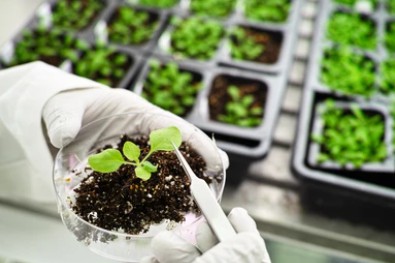We use cookies to understand how you use our site and to improve the overall user experience. This includes personalizing content and advertising. Read our Privacy Policy

Pentadin is a sweet protein discovered and isolated in 1989 from the fruit of Oubli (Pentadiplandra brazzeana Baillon), a climbing shrub growing in some tropical countries of Africa. Pentadin has a molecular weight estimated to be 12 kDa. It is highly sweet compared to sucrose but less sweet than other natural sweet proteins such as monellin and thaumatin. Pentadin has a clean sweet taste with no bitterness or aftertaste. Pentadin is derived from natural plant sources that have long been consumed by humans and animals, making it safer than artificial sweeteners. With the development of transgenic technology, the development of transgenic plants capable of expressing pentadin has become a hot topic in agricultural research.
At Lifeasible, the transgenic team is equipped with the latest technology and state-of-the-art facilities. We proudly offer you a comprehensive, fully customizable solution for pentadin transgenic plant development. Our team can customize a thoughtful trial protocol to meet your project goals and timeline.
Lifeasible's scientists will develop a detailed plan for you, providing one-on-one service. From the identification of the plant species to the final delivery of the transgenic results, we will stay in touch with you and provide timely feedback on the experiment’s status.
| Service Step | Service Content |
| Selecting the right plant | We select the plant species according to the purpose of the customer; crops, fruits, vegetables, etc. are within our capabilities. After determining the plant species, we will select the appropriate Agrobacterium strains, vectors, promoters, etc., for you. |
| Plant expression vector construction | The pentadin gene will be optimized for plant codon use and cloned into a vector under the control of a strong promoter (e.g., CaMV35S or Ubi1). |
| Plant transformation | Transformation of vectors into plant cells or tissues using Agrobacterium-mediated transformation, gene gun method, or electroporation. Transgenic plants expressing the pentadin gene are selected using appropriate selection markers, such as kanamycin or thaumatin. The regenerated shoots are then transferred to a rooting medium and grown in a greenhouse. |
| Characterization of pentadin transgenic plants | We will extract total protein from leaf samples and then analyze the expression level and stability of pentadin in transgenic plants using PCR, RT-PCR, Western blotting, or ELISA. |
| Safety analysis of pentadin transgenic plants | Evaluate the sweetness and safety of transgenic plants using methods such as taste tests, animal feeding tests, or toxicity tests. The sweetness of pentadin can also be compared to sucrose using equimolar solutions. |
Technical means: Agrobacterium-mediated transformation, particle bombardment, electroporation
Agrobacterium tumefaciens strains: LBA4404, GV2260, AGL-1, EHA105, etc.
Vectors: pBI121, pCAMBIA1300, E8-MIR-HSP, etc.
Plant types that can be transformed: tobacco (Nicotiana plumbagnifolia), potato (Solanum tuberosum), strawberry (Fragaria × ananassa), carrot (Daucus carota subsp. sativus), rice (Oryza sativa), apple (Malus domestica), celery (Apium graveolens), sunflower (Helianthus annuus), citrus (Citrus spp.), etc.
Delivery results: at least 10 T0 positive pentadin transgenic plants, experimental data, pictures, standard genetic transformation experiment report.

The Lifeasible team is committed to providing first-class guidance and support throughout the pentadin transgenic plant development process. It is our goal to develop transgenic plants that stably express pentadin for you. If you would like to collaborate with us, please feel free to contact us.
Get Latest Lifeasible News and Updates Directly to Your Inbox
Mechanisms Regulating Plant Chloroplast Biogenesis
April 15, 2025
We use cookies to understand how you use our site and to improve the overall user experience. This includes personalizing content and advertising. Read our Privacy Policy